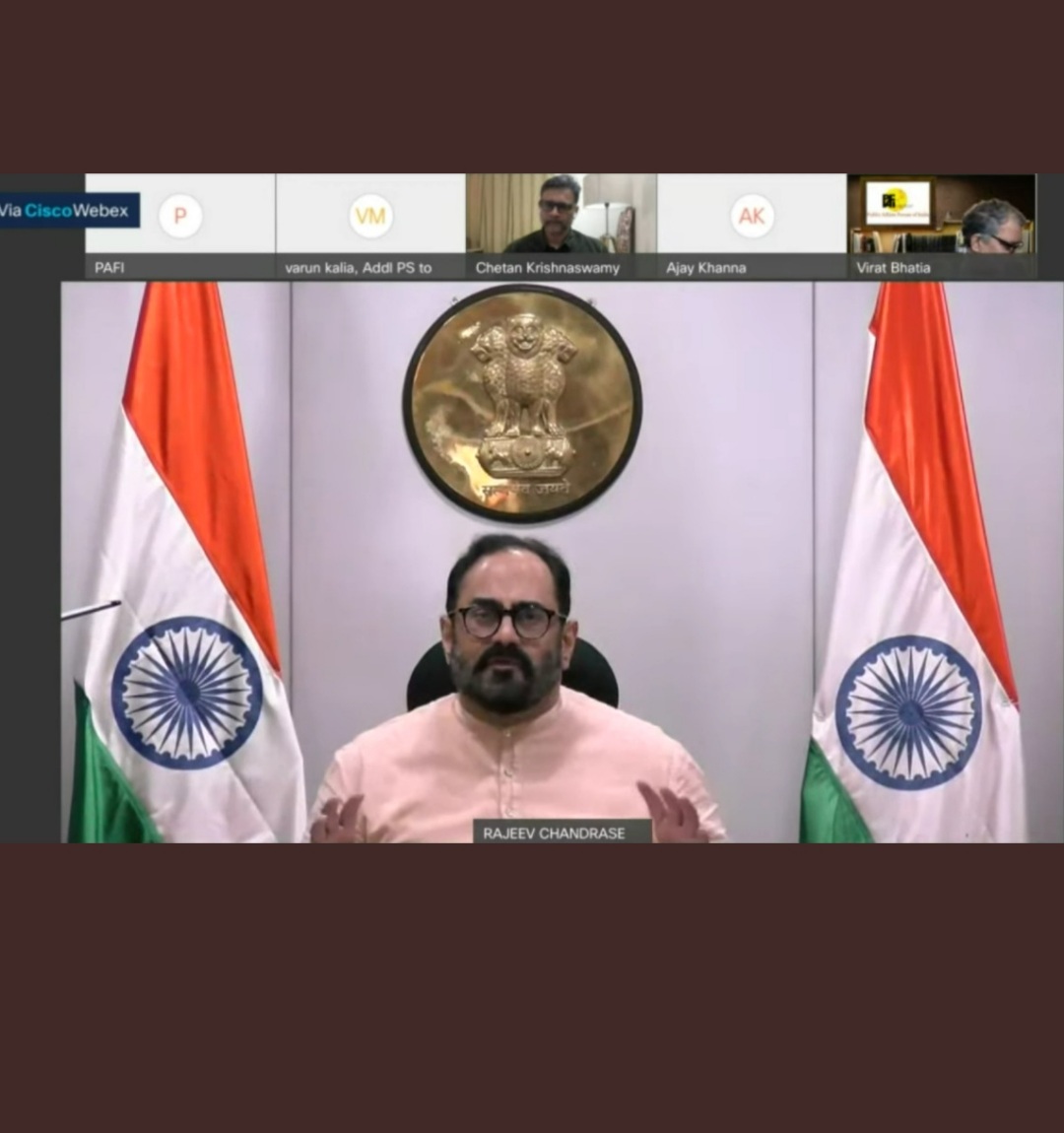‘Tech space is the beacon for what the women of India can do’
Bengaluru, NFAPost: India has ambitions of becoming an electronic manufacturing hub and a trusted player in the global value chain, and it has been working to create the required ecosystem, said Minister of State for Electronics and IT and Skill Development and Entrepreneurship Rajeev Chandrasekhar.
Speaking at the Public Affairs Forum of India (PAFI)’s 8th National Forum with the theme “Reviving the Economy: Reimagine. Reboot. Reform” that was held virtually today, Rajeev Chandrasekhar said in 2014-15, India had electronic production of Rs 1.8 lakh crore, which now five years later has reached Rs 5.5 lakh crore.
“We were marginal players for decades. But we have grown on the back of precision policy action, target policy action. There is a success story to look at. There is a clamour for a trusted valued chain. It is our intention to be a significant player in that space. Our ambitions are reasonable. By 2024-25, we want electronic manufacturing worth USD 250-300 billion in India,” he said.
Explaining India’s ability to deliver on the global demand of diversified supply chain, Rajeev Chandrasekhar said India is a very significant provider of trusted goods and service to the global market.
“There is an opportunity and we are acting on it. This is Y2K moment for digital economy and its stakeholders,” said Rajeev Chandrasekhar.
Rajeev Chandrasekhar said the government was looking beyond devices and communication, with expansion plans looking at equipment and system, and further to automotive and medical equipment.
Stressing on Prime Minister Mr Narendra Modi’s calls for a mission to make India’s “electronic power”, he said the approach to making India the electronic manufacturing hub was backed with policy actions and a comprehensive ecosystem, which will bring investments and create jobs.
Speaking about the manufacturing of semiconductors, Rajeev Chandrasekhar said the government has an ambitious vision of becoming an electronic manufacturer.
“It is different from other countries. It is not a headline-grabbing initiative. It is about getting deep, sustainable, and competitive in semiconductor and component space for many decades. At some point in not so distant future we will have the ability to manufacture semiconductors,” said Rajeev Chandrasekhar.
Talking about the broad contours of the Data Protection Bill, the Minister said the government’s aim at legislation was not to create any obstacles for the Industry but ensuring what the consumer seeks protection against.
Explaining how young women in Kashmir asked him to start poly technique courses in coding, programming and electronics, Rajeev Chandrasekhar said women in technology are so empowered not just for the tech sector but for the country.
“Prime Minister and the government have unleashed aspirations and dreams of people wanting to learn, skill, get opportunities that their parents did not have. Polytechnics should start looking at more women-oriented courses,” said the Minister.
PAFI Managing Committee Member and Vice President, Indian Public Policy, Amazon India Chetan Krishnaswamy welcomed the speakers. Twitter India Senior Manager, Public Policy & Philanthropy Shagufta Kamran presented closing remarks. The session was moderated by Apple India Vice President and Managing Director Virat Bhatia.
Mr. Ajay Khanna, Forum Chairman & Co-Founder, PAFI and Group – Global Chief Strategic & Public Affairs, Jubilant Bhartia Group read out Hon’ble Prime Minister Mr Narendra Modi’s message underlining, “Our government has been committed to ensure that governance becomes process-driven and people-centric. The role of valued stakeholders such as PAFI assumes even greater importance in such a scenario to capitalise on the opportunities in the resurgent New India.”
PAFI (Public Affairs Forum of India)
PAFI is dedicated to raise and maintain standards in Public Affairs to enable the profession to attain recognition and credibility by bringing in a paradigm shift in the way businesses engage with stakeholders – Government, Media, Civil Society and Academia. It also endeavors to deepen and broaden the talent pool to create young leaders from diverse backgrounds while planning to expand its footprint across India. Since its inception in 2008, PAFI has been actively promoting and upholding transparency, probity, inclusion, and diversity across the wider remit of Public Affairs Profession Spanning Policy Advocacy, Government Relations, Corporate Communications and Corporate Social Responsibility. It acts as a cross-sector networking platform for public affairs professionals and provides opportunities to benefit from interactions with one other as well as with key policymakers and influencers through evidence-based research, closed-door dialogues, interactive panel discussions, seminars, an Annual Lecture and the National Forum, its annual flagship event.
For more information, visit: www.pafi.in and Twitter: @PAFI_India





